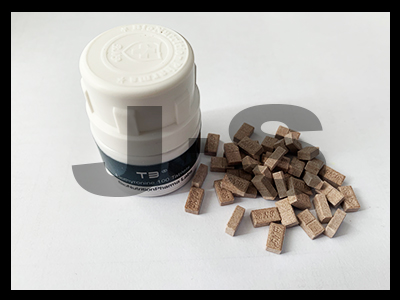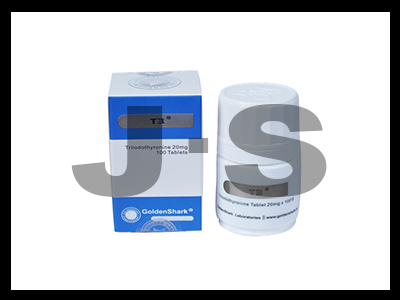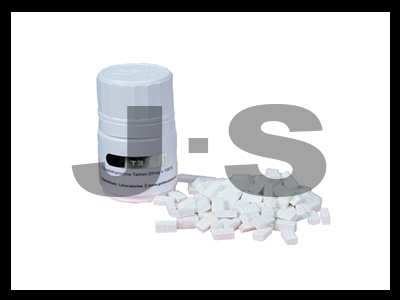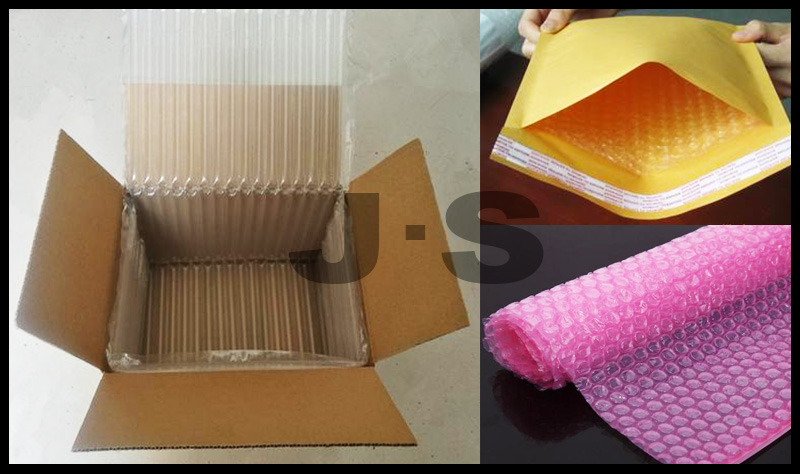
T3 Tablet
GENERIC NAME(S): Triiodothyronine
Name: T3 /Triiodothyronine
Form: Tablets/Pills
Dosage: 20mg/tablet
Package: 100tablets/bottle.
Inventory: 1000 bottles for sell.
MOQ:10 bottles.
Pack material: Shockproof film, shockproof envelope, and Cartons.
Logo: with or without both ok.
OEM: Offer OEM service. Customed dosage & brand & LOGO & package. OEM MOQ is 100 bottles.
Shipment: By express to buyers’ door. 100% make sure delivery.
Payment: TT/ Western Union/BTC/ETV/VISA and so on, please contact by email.
Shipment time: Within three working days after payment. Usually need ten days to arrive buyers’ address. Resend if lost.

Treating Thyroid Disease With Triiodothyronine (T3) Drugs
If you been diagnosed with hypothyroidism, it's virtually certain that you've been prescribed the drug levothyroxine (marketed under the brand names Synthroid, Levoxyl, and others)—a synthetic hormone that replenishes the thyroid hormone thyroxine, also known as T4. But if you are on levothyroxine and still not feeling well, another drug known as Cytomel (liothyronine) may help. This is the synthetic form of the hormone triiodothyronine, known as T3, which is equally important to healthy metabolic function. Some endocrinologists also endorse the use of natural desiccated thyroid (NDT), a T3 drug derived from dried glands of pigs or cows.


T4 vs. T3
Thyroxine (T4) and triiodothyronine (T3) are the two major hormones produced by the thyroid gland. Their role is to regulate metabolism, the conversion of oxygen and calories into energy. Of the two, T3 has four times the hormonal strength of T4.
This is because T3 is considered the active form of thyroid hormone. It is derived from T4, the "storage hormone," through a process known as monodeiodination in which T4 loses an atom of iodine to become T3.
While T3 drugs like Cytomel may seem the ideal choice for hormone replacement therapy, T3 is rapidly absorbed in the intestines and can build up quickly, leading to symptoms of hyperthyroidism (overactive thyroid).
By contrast, T4 drugs like levothyroxine are absorbed more gradually and are able to maintain a steady state in the blood, providing the body with all the T4 it needs to synthesize T3.1
Another concern is that T3 drugs can affect the T4 blood tests used to monitor the effectiveness of hormone replacement therapy. For these reasons, many doctors consider T3 drugs unnecessary.2
When combination therapy with both T4 and T3 are used, it can be difficult to maintain a normal T4-to-T3 ratio, which is between 13:1 and 16:1. In fact, several of the clinical trials comparing T4 alone to a T4 plus T3 combination ended up creating mild hyperthyroidism.

Potential Benefits of Adding T3
There remains ongoing debate within the endocrinology community about many facets of thyroid treatment, including the appropriate time to start treatment, the use of TSH to direct the initiation of treatment, and the appropriateness of natural desiccated hormones when compared to synthetic hormones.
The benefits of T3 have also been under debate. Despite resistance from many in the treating community, a growing body of research is shedding light on the appropriate use of T3 drugs in people with hypothyroidism. Among them:
Research published in the Journal of Clinical Endocrinology reported that a genetic defect, known as a deiodinase polymorphism, can significantly interfere with the conversion of T4 into T3, explaining why some people on levothyroxine fail to respond to treatment.3
A small study overseen by the National Institute of Diabetes and Digestive and Kidney Diseases found that supplemental T3 can lower cholesterol levels, reduce body weight, and offer better resolution of hypothyroid symptoms without any signs of extra cardiovascular stress compared to levothyroxine alone.1
A small Danish study reported that people treated with levothyroxine plus T3 had improved quality of life and depression scores. Moreover, 49 percent of the study participants preferred the combination treatment, compared to only 15 percent who preferred levothyroxine alone
Most experts agree that the large majority of people with hypothyroidism do very well with T4 alone. However, there are clearly some people who benefit from combined therapy. If symptoms persist on T4, it may be worthwhile considering trying combination therapy.
Current guidelines from the American Thyroid Association recommend that people with hypothyroidism be treated initially with T4 alone.5 Adding T3 should be considered in people who continue to have symptoms of hypothyroidism, and whose T3 levels remain in the low end of the normal range
Cytomel (Liothyronine)
Cytomel (liothyronine) is used to treat hypothyroidism. It can also be used to treat other thyroid disorders such as goiter or as an adjunctive treatment to thyroid cancer therapy. It was first approved for use by the U.S. Food and Drug Administration (FDA) in 1956 and is today marketed under different brand names, including Triostat.
Formulation and Dosage
Cytomel is available as a round, whitish tablet in a 5-microgram (mcg), 25-mcg, and 50 -mcg dose options. The recommended dosage depends on the condition being treated and the level of thyroid gland dysfunction.
Proper dosing of Cytomel is relatively difficult. The normal ratio of T4 to T3 should be maintained, generally aiming at a 16:1 ratio. Furthermore, because Cytomel is relatively short-acting, its dosage should be split in half and taken twice a day. Combination therapy can be tricky, and should best be managed by an endocrinologist.
Side Effects
With the exception of triggering hyperthyroid symptoms, side effects from Cytomel are rare. In such cases, skin reactions, generally mild, have been reported
Interactions
Cytomel is known to interact with certain common medications. Among them:6
Cytomel and other thyroid hormone drugs can enhance blood clotting. If you are taking anticoagulants (blood thinners) like warfarin, your doctor may need to increase your dose to compensate for this effect.
Cytomel can also increase blood insulin levels. The routine monitoring of your blood glucose is recommended if you have diabetes. In some cases, a dose adjustment of your diabetes drugs or insulin may be needed.
Estrogen-based contraception may interfere with the bioavailability of Cytomel (the amount of active drug circulating in the blood. Cytomel doses may need to be increased if you are on estrogen-based birth control.
Cytomel can potentially increase the side effects of tricyclic antidepressants and even trigger bouts of arrhythmia (abnormal heartbeats). An alteration in the antidepressant dose or a substitute antidepressant may be needed.
Antacids and the cholesterol-lowering drugs Colestid (colestipol) and Questran (cholestyramine) can interfere with the absorption of Cytomel. To avoid this, always separate the doses of Cytomel and the other drugs by at least four hours.
Contraindications and Considerations
Cytomel should not be used in people with untreated adrenal insufficiency (when the adrenal gland do not produce enough of the hormone cortisol) or thyrotoxicosis (excessive thyroid levels by any cause)
Cytomel is not absorbed in fetal tissue and is therefore considered safe during pregnancy. While liothyronine can be passed through breastmilk, the amount secreted is so small as to be considered harmless.
Natural Desiccated Thyroid
Some doctors have found success in treating their thyroid patients with natural desiccated thyroid, also known as NDT. NDT is derived from the dried (desiccated) thyroid glands of pigs or cow and provides T3, T4, and other thyroid hormones found in the human thyroid gland.
NDT is marketed under various brand names in the United States, including Armour Thyroid, Nature-Throid, and WP Thyroid.
While natural desiccated thyroid hormone has been used for more than a century to treat thyroid disorder, it has not been approved by the FDA for such treatment.
Despite this, a growing number of doctors and patients have embraced the NDT as the natural alternative to levothyroxine and liothyronine, including former Secretary of State Hillary Rodham Clinton.
Because NDT is much easier to prescribe than Cytomel (because there are no calculations involved aimed at preserving a normal T4-T3 ratio), it has become the drug of choice among many non-endocrinologists who treat thyroid disease.
However, NDT provides a ratio of T4-T3 that is not natural to humans (4:1 instead of 16:1), which tends to produce some degree of hyperthyroidism, and most experts still do not recommend its usage.
Formulation and Dosage
Most NDT brands come in an off-white tablet in 15-, 30-, 60-, 90-, 120-, 180-, 240-, and 300-milligram (mg) doses. Recommended dosages can vary by your condition, lab test results, and response to treatment:
For mild hypothyroidism, most doctors start with a 30-mg dosage once daily, increasing by 15 mg per day for six weeks or until the desired response is achieved. The usual maintenance dose is 180 mg once daily.
For severe hypothyroidism, it is best to start at a lower dose and increase gradually until the desired response is achieved. The usual maintenance dose is 180 mg once daily.
For congenital hypothyroidism, the once-daily dosage varies by age: 15 to 30 mg for children under 6 months, 30 to 45 mg for ages 6 to 11 months; 45 to 60 mg for ages 1 to 5 years; 60 to 90 mg for ages 5 to 12 years; and 90 to 180 mg for older kids.
Side Effects
NDT can potentially cause hyperthyroidism if overused, improperly used, or used without regular thyroid blood testing. Beyond this, side effects are rare, although skin reactions have been known to occur.
Interactions
The interactions for NDT are similar to those for Cytomel. Be sure to speak with your doctor about any and all drugs you may be taking, whether they are prescription, over-the-counter, nutritional, homeopathic, naturopathic, traditional, or herbal.
Contraindications and Considerations
As with Cytomel, NDT should not be used in people with untreated adrenal insufficiency or thyrotoxicosis and is considered safe during pregnancy and breastfeeding.
A Word From Verywell
If you don't feel as well as you think you should, even if your thyroid test results fall within the normal range, speak with your doctor. While you may be interested in trying a T3 drug, know that some doctors may recommend that you stick with levothyroxine, given that it is the standard of care for hypothyroidism per guidelines set forth by the American Association of Clinical Endocrinologist (AACE) and American Thyroid Association (ATA). While that endorsement is worth great consideration by both patients and physicians, many patients have had success with T3 drugs, and your doctor should be open to a discussion about them.
If OVERDOSE is suspected
If you think there has been an overdose, call your poison control center or get medical care right away. Be ready to tell or show what was taken, how much, and when it happened.
Consumer information use
If your symptoms or health problems do not get better or if they become worse, call your doctor.
Do not share your drugs with others and do not take anyone else's drugs.
Keep all drugs in a safe place. Keep all drugs out of the reach of children and pets.
Throw away unused or expired drugs. Do not flush down a toilet or pour down a drain unless you are told to do so. Check with your pharmacist if you have questions about the best way to throw out drugs. There may be drug take-back programs in your area.
Some drugs may have another patient information leaflet. Check with your pharmacist. If you have any questions about nandrolone, please talk with your doctor, nurse, pharmacist, or other health care provider.
If you think there has been an overdose, call your poison control center or get medical care right away. Be ready to tell or show what was taken, how much, and when it happened
Warnings
PELIOSIS HEPATIS, A CONDITION IN WHICH LIVER AND SOMETIMES SPLENIC TISSUE IS REPLACED WITH BLOOD-FILLED CYSTS, HAS BEEN REPORTED IN PATIENTS RECEIVING ANDROGENIC ANABOLIC STEROID THERAPY. THESE CYSTS ARE SOMETIMES PRESENT WITH MINIMAL HEPATIC DYSFUNCTION, BUT AT OTHER TIMES THEY HAVE BEEN ASSOCIATED WITH LIVER FAILURE. THEY ARE OFTEN NOT RECOGNIZED UNTIL LIFE-THREATENING LIVER FAILURE OR INTRA-ABDOMINAL HEMORRHAGE DEVELOPS. WITHDRAWAL OF DRUG USUALLY RESULTS IN COMPLETE DISAPPEARANCE OF LESIONS. LIVER CELL TUMORS ARE ALSO REPORTED. MOST OFTEN THESE TUMORS ARE BENIGN AND ANDROGEN-DEPENDENT, BUT FATAL MALIGNANT TUMORS HAVE BEEN REPORTED. WITHDRAWAL OF DRUG OFTEN RESULTS IN REGRESSION OR CESSATION OF PROGRESSION OF THE TUMOR. HOWEVER, HEPATIC TUMORS ASSOCIATED WITH ANDROGENS OR ANABOLIC STEROIDS ARE MUCH MORE VASCULAR THAN OTHER HEPATIC TUMORS AND MAY BE SILENT UNTIL LIFE-THREATENING INTRA-ABDOMINAL HEMORRHAGE DEVELOPS. BLOOD LIPID CHANGES THAT ARE KNOWN TO BE ASSOCIATED WITH INCREASED RISK OF ATHEROSCLEROSIS ARE SEEN IN PATIENTS TREATED WITH ANDROGENS AND ANABOLIC STEROIDS. THESE CHANGES INCLUDE DECREASED HIGH-DENSITY LIPOPROTEIN AND SOMETIMES INCREASED LOW-DENSITY LIPOPROTEIN. THE CHANGES MAY BE VERY MARKED AND COULD HAVE A SERIOUS IMPACT ON THE RISK OF ATHEROSCLEROSIS AND CORONARY ARTERY DISEASE.
How do I store and/or throw out?
If you need to store it at home, talk with your doctor, nurse, or pharmacist about how to store it.
PROTECT FROM LIGHT. Store in carton until contents are used.
ATTENTION: All these products are strictly for LABORATORY AND RESEARCH PURPOSES ONLY. They are not to be used for any human and veterinary purposes.


Boldenone, Oxymetholone, Drostanolone, Testosterone, Nandrolone, Trenbolone
Designed by HuishangMedia
Copyright © 2008-2022 J·S Biology Co.,LTD All Rights Reserved
Design by Huishang Media
Under CC: ultimatearm, Freepik, Nhor Phai, DinosoftLabs, Vitaly Gorbachev, Kiranshastry, Pixel perfect
If you have any questions or ask for a quote, please submit your information here and we will respond to you immediately.